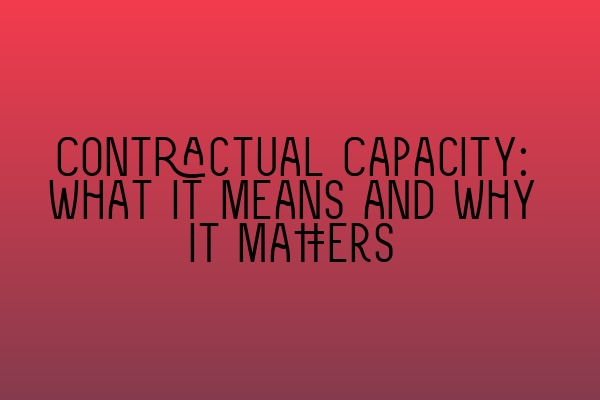Contractual Capacity: What It Means and Why It Matters
When entering into a contract, one of the key considerations is whether both parties have the necessary contractual capacity. Contractual capacity refers to the legal ability of parties to understand the nature and consequences of their contractual obligations and to form a binding agreement. In simple terms, it means that the individuals involved must be mentally sound and of a certain age to enter into a legally enforceable contract.
Age of Majority
One important aspect of contractual capacity relates to the age of the parties involved. In most jurisdictions, individuals must be of a certain age, known as the age of majority, to enter into contracts. The age of majority varies from country to country, and sometimes even within different regions of the same country.
For example, in the United Kingdom, the age of majority is 18. Therefore, individuals under the age of 18 are generally considered to have limited capacity to enter into contracts. However, there are some exceptions to this rule, such as contracts for necessities like food, clothing, and shelter.
It’s essential to consider the age of the parties involved when drafting or entering into a contract. If one of the parties is below the age of majority, special rules and considerations may apply, and legal advice should be sought to ensure the contract’s enforceability.
Mental Capacity
In addition to age, mental capacity is another crucial factor in determining contractual capacity. Parties must have the mental ability to understand the terms of the contract and the consequences of their actions.
Individuals who lack mental capacity, such as those with cognitive impairments or mental illnesses, may be deemed to have limited contractual capacity. In such cases, special provisions may be necessary to protect their interests and ensure fairness in the contractual relationship.
If there is a question regarding an individual’s mental capacity, it may be prudent to seek a professional assessment or involve a guardian or power of attorney who can act on the individual’s behalf. This ensures that the contract is entered into with the individual’s best interests in mind.
Implications of Lack of Capacity
Entering into a contract with someone who lacks contractual capacity can have serious consequences. If a party is later found to have lacked the necessary capacity at the time of entering into the agreement, the contract may be voidable.
Voidable contracts are those that can be legally canceled or avoided by one or both parties. The party lacking capacity has the option to affirm or disaffirm the contract once they regain full capacity or with the assistance of a legal representative.
On the other hand, contracts entered into by individuals with limited capacity can still be enforceable but may require additional scrutiny. Courts may assess the fairness of the contract and consider factors such as the weaker party’s ability to understand the terms, any undue influence or pressure exerted, and whether safeguards were in place to protect their interests.
Seek Professional Advice
Given the complexity and potential legal consequences regarding contractual capacity, it is crucial to seek professional legal advice when entering into contracts. A solicitor specialized in contract law can provide guidance on the requirements and implications of contractual capacity, ensuring that your agreements are valid, enforceable, and protect your rights and interests.
At SQE Contract Law, our team of experienced solicitors can assist you in understanding and navigating the complexities of contractual capacity. Contact us today for professional advice and guidance in all aspects of contract law.
